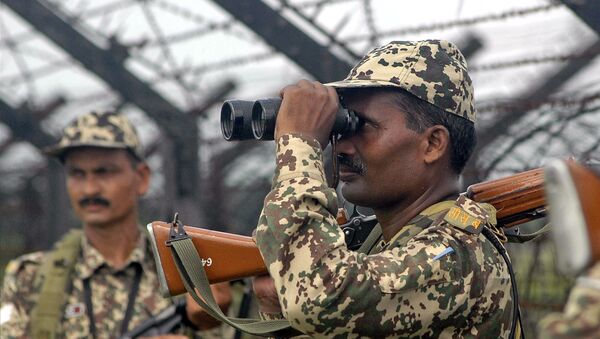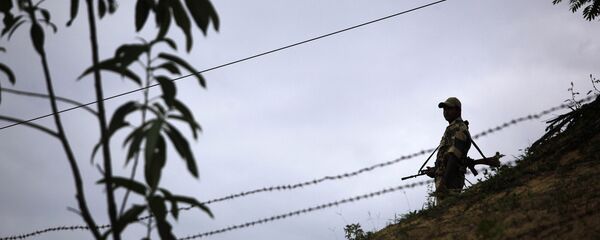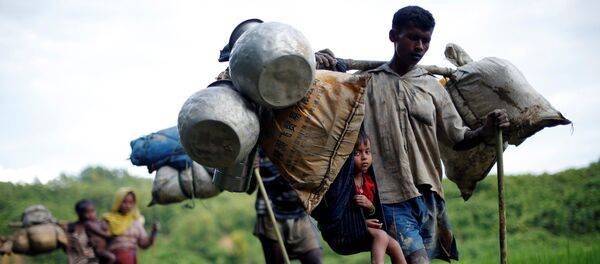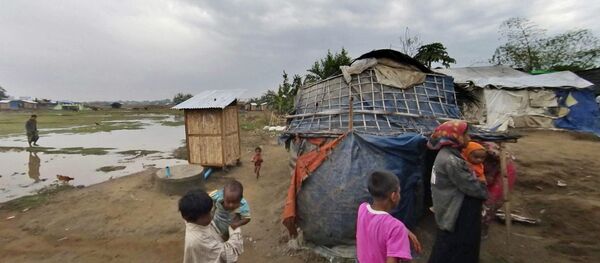The repatriation of Rohingya refugees living in temporary camps in Bangladesh has taken a back seat since the United Nations High Commissioner for Human Rights Michelle Bachelet called on the country's government to halt the process earlier this month citing a lack of accountability on Myanmar's part. The UN body took the call after observing that the Rohingya refugees themselves did not want to return to Myanmar as they feared for their lives.
There are almost one million Rohingya refugees living in various camps across Cox Bazar in Bangladesh in what is being described as one of the worst humanitarian crises. The crisis has also acquired a security dimension with neighbouring countries, mainly India, being concerned over the infiltration of Islamic extremism amongst the Rohingyas, who have grown increasingly desperate over their plight.
Sputnik spoke to Major General (Retired) A K Siwach of the Indian Army on Bangladesh stalling the repatriation of Rohingyas and its security implications for India.
Sputnik: With the repatriation being stalled indefinitely, concerns are being voiced that the refugees may never return to Myanmar from Bangladesh. Do you foresee security implications for India?
However, the border between Bangladesh and India is still porous, so a few of them are trying to get into India. Few of them have already succeeded. There are 40,000 Rohingyas in India who earlier came as refugees. And now, few of the Bangladeshi Rohingyas which are there in Cox Bazar have also managed to cross over.
The Rohingyas who are in Bangladesh, if they do not go back to Myanmar in time, the chances of them coming inside India through Chittagong hills is very much possible. And this is a real threat we must be alert about.
READ MORE: India Deports Seven Rohingya Muslims to Myanmar After Court's Nod
Sputnik: What steps should the Indian government take in this situation?
A K Siwach: As of today, the BSF (Border Security Force) is manning the border between Bangladesh and India. The fences have by and large come at most of the places and hence the chances of their infiltration through the fence are less. We have to be very careful as the chances of their infiltration are very high. So the BSF has to be very alert. BSF has to ensure proper patrolling. At the riverine terrain where there is no fencing, the surveillance has to increase.
Intelligence gathering must be strengthened and activated and there should be coordination between central, state, BSF, and Army intelligence wings. And any input regarding infiltration should be shared on a priority basis. Therefore it has to be a multi-pronged strategy. One is that intelligence agencies must be alert and alive that any information they are getting must be shared. Second, the BSF must be very much alert knowing that the chances of Rohingyas infiltrating from Bangladesh is very high.
Sputnik: What kind of threat do the Rohingyas living in India pose?
The chances of Rohingyas getting radicalised is very high because they are a vulnerable class. Some of Rohingyas obtained Indian passports, Permanent Account Number (PAN) cards, and Aadhaar (biometric ID) cards. There are chances of them getting radicalised and being used for sabotage activities. Earlier, some of the Rohingyas possessing PAN and Aadhaar cards were caught in Kerala. They are a big security risk and they must be deported when it is feasible and possible.
READ MORE: Myanmar Authorities Reject UN Findings on Rohingya Abuses — Reports
Sputnik: The Indian government has declared that they will deport Rohingyas but the process has been stalled due to protests from various opposition parties. What is your take on this?
A K Siwach: Rohingyas must be deported back to Myanmar. India should be very clear on this issue.
None of the Muslim-dominated countries accept them as everyone knows that they are a security threat. As far India is concerned, we are very much clear that they must be returned back to Myanmar as and when the security situation improves.
Sputnik: Recently, the Indian government decided to allow Bangladeshi tourists to visit Sikkim, Arunachal Pradesh, and Ladakh. Do you think Rohingyas could infiltrate these areas in the guise of tourists?
A K Siwach: There is no doubt about it. Once we have opened it for Bangladeshi nationals they can come under the garb of Bangladeshi nationals and some of the Rohingyas may able to infiltrate into the states of Arunachal Pradesh, Sikkim, and Ladakh. Our checking process in these points must be able to assess them properly to ensure that no Rohingya under the garb of a Bangladeshi national tries to infiltrate.
The views and opinions expressed by Speaker in this article are those of the speaker and do not necessarily reflect the position of Sputnik.




